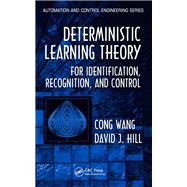Deterministic Learning Theory for Identification, Recognition, and Control
, by Cong Wang; David J. Hill- ISBN: 9781420007763 | 1420007769
- Cover: Nonspecific Binding
- Copyright: 10/3/2018
Deterministic Learning Theory for Identification, Recognition, and Controlpresents a unified conceptual framework for knowledge acquisition, representation, and knowledge utilization in uncertain dynamic environments. It provides systematic design approaches for identification, recognition, and control of linear uncertain systems. Unlike many books currently available that focus on statistical principles, this book stresses learning through closed-loop neural control, effective representation and recognition of temporal patterns in a deterministic way. A Deterministic View of Learning in Dynamic Environments The authors begin with an introduction to the concepts of deterministic learning theory, followed by a discussion of the persistent excitation property of RBF networks. They describe the elements of deterministic learning, and address dynamical pattern recognition and pattern-based control processes. The results are applicable to areas such as detection and isolation of oscillation faults, ECG/EEG pattern recognition, robot learning and control, and security analysis and control of power systems. A New Model of Information Processing This book elucidates a learning theory which is developed using concepts and tools from the discipline of systems and control. Fundamental knowledge about system dynamics is obtained from dynamical processes, and is then utilized to achieve rapid recognition of dynamical patterns and pattern-based closed-loop control via the so-called internal and dynamical matching of system dynamics. This actually represents a new model of information processing, i.e. a model of dynamical parallel distributed processing (DPDP).






